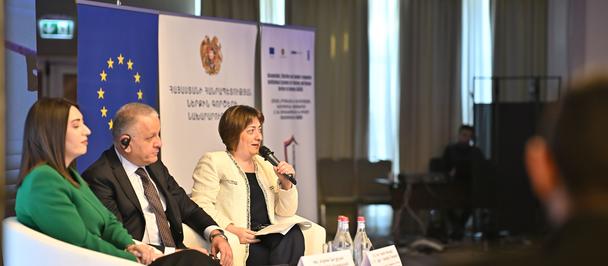Rebuilding from Ashes in North Kivu
May 27, 2025

Francine stands in front of the tent she erected on the ashes of her home after returning to her village in North Kivu. A leader and survivor, she is committed to supporting her community as they rebuild from devastation.
The road back to Kimoka in North Kivu was not just long, it was steeped in uncertainty and loss. Francine walked it with her neighbours, returning to a place that no longer felt like home. When they arrived, they only found the remnants of lives interrupted, over and over: homes burned to the ground, fields ransacked or occupied, and businesses – once built with care – reduced to ashes.
Before the violence, Francine had been a pillar of her community. As president of the RAVEC Faida Yetu ("Our Interest") committee, she led a local microcredit initiative that supported nearly 400 members — more than 300 of them women. With small loans, these women had bought land, launched businesses, run grain mills, stitched and sold clothing. “Many of our husbands were unemployed,” Francine explains. “It was we, the women, who kept our families afloat.”
Then came 11 February 2024. A wave of violence swept through their village of Sake, forcing Francine and her neighbours to flee – not once, but five times – each time inching closer to Goma. Every escape meant starting over, leaving behind what little they had managed to salvage: blankets, pots, merchandise and precious savings.

A displaced woman sits with her child in the courtyard of a school where over 1,000 people have sought refuge. At night, they sleep in classrooms. During the day, they wait under the sun in the courtyard while children from the host community use the school.
Life in the camps was harsh: limited food, water and security. Some women were raped while searching for firewood. Others lost their children to hunger and illness. Still, even amid that desperation, Francine organized small savings groups to support one another. We had nothing,” she says, “but we helped each other survive.”
The M23 armed group’s rapid advance into the city of Goma a few weeks ago led to the camp’s dismantling, and all displaced people had to return where they originally came from.
But Francine is not giving up.
“We no longer have any reference points," she says. "Our land, our tools, our businesses, everything is gone. But we are not giving up. We will rebuild, together.”
Standing in a destroyed village, with nothing left but scorched earth and collective will, Francine is still moving forward: rebuilding, together with the other women who have refused to be broken.
“Our land, our tools, our businesses, everything is gone. But we are not giving up. We will rebuild, together.”– Francine
In the midst of an ongoing crisis in eastern DRC, the return of displaced families like Francine’s is fragile. Without urgent and sustained support, their recovery may never fully begin.
That’s where UNDP can make a difference, by helping women like Francine access the tools they need to rebuild: housing, seeds and tools for farming, and support for small businesses. Not only emergency aid, but long-term solutions rooted in dignity, resilience and local leadership.
Francine’s strength is not in what she has, but in what she believes is still possible. What her community needs now are partners who believe in that future too.

Patrick d’Oliveira, Head of UNDP’s Sub-Office in Goma, speaks with members of the women’s committee who have recently returned to their village, now reduced to ashes. Together, they discuss what is needed to rebuild lives, livelihoods and hope.

 Locations
Locations



